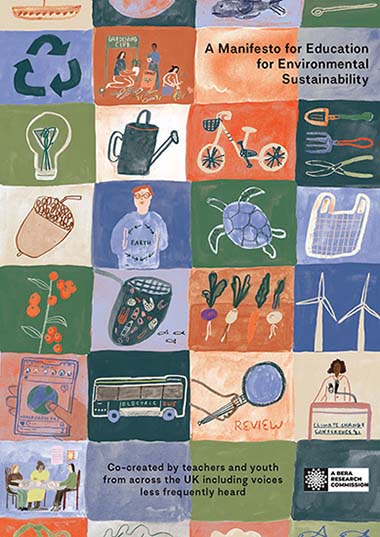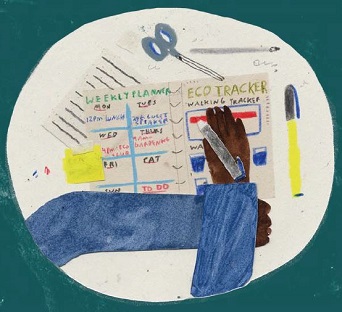3.2 BERA’s manifesto advocates…
Key elements of sustainable pedagogies

BERA (2021) commissioned A Manifesto for Education for Environmental Sustainability, presented as a patchworking of views, which was co-created by young people and teachers, facilitated by higher education researchers. They advocate that education has a key role to play in creating long-term responses to the social and environmental consequences of the climate crisis. The manifesto presents priorities at the class, school, community and policy level.
This evidences that both young people and teachers want to see change at all levels to value sustainability in their institutions – not only in teaching and learning – but also in the way institutions are operated and regulated. Together, these multigenerational voices call for the environment to be part of all subjects and educational practices. This will require continuing professional development for teachers and lecturers of all subjects to help them gain confidence in teaching about sustainability. They recommend greening their local environments, including procurement and food waste policies, growing food and other plants as a way to contribute to the global effort towards sustainability.
Implications for assessment
BERA’s manifesto recommends changes to assessment by recommending externally accredited awards for students and teachers with an environmental sustainability focus; for older students, these awards should carry UCAS points. They also recommend involving the local community in a ‘sustainability curriculum’ to ensure that multigenerational voices continue to be drivers for what is needed, along with a campaign to enlist the endorsement of politicians and social media influencers to extend the reach and impact of these local actions.
According to BERA’s manifesto sustainable pedagogies are those that enable students to develop the following capabilities:
BERA’s capabilities
|  |
 Reflection
Reflection
Reflect on how these sustainable pedagogies in BERA’s manifesto relate to UNESCO’s key competencies for sustainable development in Table 1 [Tip: hold Ctrl and click a link to open it in a new tab. (Hide tip)] .
What do they have in common? What are their differences?
 Explore
Explore
If you wish to read more about international attention to and use of sustainable pedagogies, then read:
Armendariz, R. and Abrom, A. (2023) ‘Encouraging Youth Leadership on SDGs Through Transforming Education’, IISD – SDG Knowledge Hub (9 August).
In the next activity you will use both the summaries of UNESCO’s key elements of sustainable pedagogies and BERA’s manifesto to begin to tease out the important aspects of sustainable pedagogies relevant to your environment and context.
Activity 1.3 What is important in sustainable pedagogies?
b.
 Reflect on whether you want to change or add to your key words on your memo in Question 1(b).
Reflect on whether you want to change or add to your key words on your memo in Question 1(b).c.
 Contribute your revised key words to the word cloud below then reflect on how well your key word ideas align with other learners’ thoughts on the word cloud.
Contribute your revised key words to the word cloud below then reflect on how well your key word ideas align with other learners’ thoughts on the word cloud.
3.1 UNESCO advocates…
